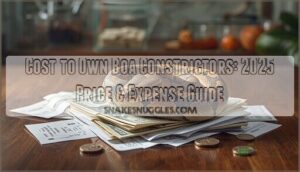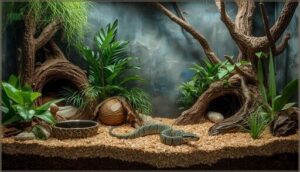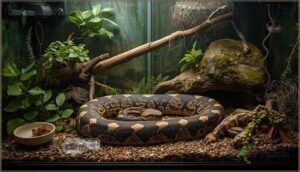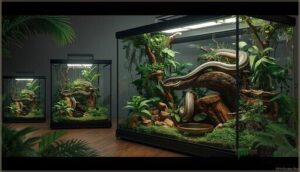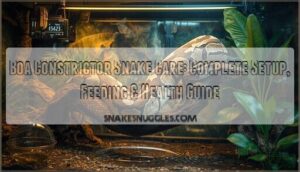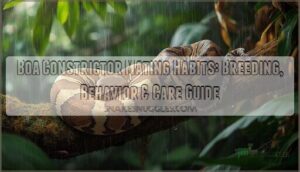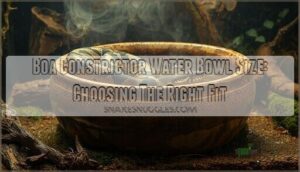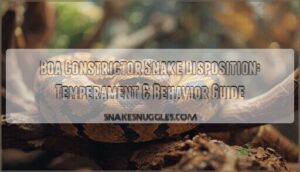This site is supported by our readers. We may earn a commission, at no cost to you, if you purchase through links.
A boa constrictor might look like a simple coil of muscle and scales, but its price tag tells another story. What begins as a $70 hatchling in a deli cup can, over the years, shift into a five-digit investment—cage, vet, and frozen rodents all included.
Owning these powerful, slow-growing reptiles means thinking far beyond the sticker price at the pet shop. Every inch they gain, every year they thrive, adds another layer to the tally.
Knowing the real cost to own boa constrictors helps you plan with confidence and avoid surprises that can bite harder than the snake itself.
Table Of Contents
- Key Takeaways
- Boa Constrictor Purchase Price Breakdown
- Initial Setup and Equipment Costs
- Ongoing Monthly and Annual Expenses
- Veterinary and Health Care Costs
- Factors Affecting Total Ownership Cost
- Long-Term Financial Commitment
- Frequently Asked Questions (FAQs)
- How much do boa constrictors cost?
- How much does a Boa imperator cost?
- Are boa constrictors good pets?
- How big do boa constrictors get?
- Do boa constrictors need maintenance?
- Are boa constrictors a snake?
- Are boa constrictors high maintenance?
- How much does it cost a month to own a snake?
- How much does a full grown boa cost?
- Is a boa constrictor a beginner snake?
- Conclusion
Key Takeaways
- The true cost to own a boa constrictor ranges from $7,500 to $12,000 over its lifetime, factoring in the snake, cage, supplies, veterinary care, and ongoing needs.
- Morph type, breeder reputation, and snake age can push a boa’s upfront cost from as low as $50 for basic juveniles to over $10,000 for rare adult morphs.
- Monthly and yearly expenses include habitat maintenance, food, heating, enrichment, and health care, often adding up to $50–$200 a month depending on the snake’s size and needs.
- Legal requirements, emergency vet bills, and eventual equipment upgrades make financial planning and research crucial before committing to boa constrictor ownership.
Boa Constrictor Purchase Price Breakdown
Your first big decision comes down to which boa you actually buy. Prices swing wildly based on age, genetics, and where you source your snake.
Let’s break down what you’ll pay and what drives those differences.
Juvenile Vs. Adult Pricing
Why does age matter when you’re shopping for a boa constrictor? Juvenile boas cost $50 to $150, while adults can reach $500 or more. Size matters because larger snakes show established health status and breeding potential. Adult boa pricing reflects market trends tied to verified genetics and reproductive value.
- Juvenile boa constrictors are easier to house initially and cost less upfront
- Adult boas command premium prices due to proven health status and breeding potential
- Age and size directly impact pet ownership costs over the first few years
- Market trends show adult boa constrictor ownership requires larger financial commitment
- Cost influences include breeder reputation, locality documentation, and reproductive rights
Understanding the needs of a boa constrictor care is essential for making an informed purchase decision.
Species and Morph Variations
Species selection and morph genetics dramatically reshape your budget. Colombian boas (Boa imperator) average $150 to $350, while true Red Tail boas (Suriname locale) command $500 to over $2,000. Color mutations like IMG morphs cost $800 to $1,000, and Scoria morphs reach $4,000 to $10,000. Gene expression and breeding costs drive specialty color morphs into premium territory.
| Morph/Species Type | Average Cost Range |
|---|---|
| Colombian Boas | $150–$350 |
| True Red Tail Boas | $500–$2,000+ |
| IMG Morphs | $800–$1,000 |
| Scoria Morphs | $4,000–$10,000 |
| Sunglow Morphs | $1,000–$2,000 |
Species rarity and color patterns determine what you’ll pay beyond basic boa constrictors.
Breeder Vs. Pet Store Costs
Where you buy your boa constrictor matters. Pet stores stock common juveniles at $50 to $150, while reputable breeders charge $150 to $500 for documented lineage. Here’s what drives that 40% average breeder markup:
- Health guarantees backing each purchase
- Verified genetics and feeding records
- Ongoing support from experienced reptile specialists
Breeder fees reflect snake quality and purchase agreements you won’t find at chain stores.
Health and Quality Factors
Health condition directly impacts what you’ll pay. Disease screening catches respiratory infections early, while quality grading reveals genetic defects like Super Motley’s fatal flaws or Scoria wobble. Breeders factor in longevity impacts and market value when pricing—healthy juveniles with clean veterinary records command premiums.
Age and size matter too, since established feeders cost more upfront but reduce your risk. Some states require permits, impacting ownership, so check exotic pet regulations.
Initial Setup and Equipment Costs
Before you bring your boa constrictor home, you’ll need to budget for the essentials that keep your snake healthy and comfortable. The upfront investment in housing and equipment generally runs between $400 and $800, depending on the quality and size of the setup you choose.
Let’s break down the main categories where you’ll be spending your money.
Enclosure and Habitat Expenses
Your enclosure setup represents the largest upfront investment in reptile care and maintenance. Basic juvenile housing starts around $200 to $500, while adult boas require custom PVC or glass enclosures costing $1,200 to $2,000. DIY enclosures can reduce expenses to $100 to $500.
Bioactive setups with furnishing costs add another $500 or more, making enclosure size a primary factor in pet snake costs.
Heating and Lighting Requirements
Beyond enclosure setup, you’ll need heating and lighting systems that maintain proper temperature gradients—75°F on the cool side to 90°F basking—using halogen flood lamps ($10–$25) or ceramic heat emitters.
Lighting schedules require programmable timers, and humidity control demands hygrometers plus occasional misting equipment.
Equipment lifespan varies, but expect annual bulb replacements and roughly $60 yearly in energy costs for boa constrictor care.
Substrate and Furnishings
Inside your enclosure, substrate and furnishings shape both aesthetics and hygiene. Coconut fiber or cypress mulch costs $10–$25 per bag, lasting one to two months depending on spot-cleaning habits.
Water bowls, hides, and climbing branches collectively run $25–$50 for starter setups.
Bioactive substrates increase upfront expenses but extend replacement intervals, balancing cost against convenience in ongoing reptile pet care and enclosure setup.
First-Year Setup Estimates
When planning your beginner setup, expect to invest $680–$1,200 in the first year for equipment alone—not counting the snake itself. Premium habitats push that figure toward $1,500–$2,000, while budget options using temporary enclosures keep initial costs under $200 for juveniles.
Consider this cost breakdown for average snake ownership expenses:
- Enclosure systems: $255–$1,500 depending on size and quality
- Climate control gear: $210–$462 for heating, lighting, and thermostats
- Monitoring tools: $12–$25 per humidity gauge or thermometer
- Water bowls and hides: $8–$50 for essential accessories
- Emergency supplies: $50–$150 for backup equipment and transport
Budget-conscious owners stretch expenses across multiple months, upgrading as their boa grows. Upgrade costs become unavoidable once juveniles reach adult dimensions—plan accordingly to avoid financial surprises in snake ownership costs and pet expenses down the road.
Ongoing Monthly and Annual Expenses
Once you’ve set up your boa’s habitat, the real day-to-day costs kick in. Most of your monthly expenses come from feeding your snake, maintaining its environment, and occasionally adding new enrichment items.
Here’s what you can expect to budget for throughout the year.
Food and Feeding Costs
Food represents one of your most predictable pet expenses with boa constrictors. Frozen rodents cost $2 to $5 per large rat, while small rabbits run about $15 each. Juveniles eat weekly, adults every 10 to 14 days. Bulk buying reduces costs substantially—expect $50 to $200 annually depending on your snake’s size and where you source prey.
| Snake Age | Prey Size | Feeding Frequency |
|---|---|---|
| Neonate | Pinkie/hopper mice (8–35g) | Every 5–7 days |
| Juvenile (3 years) | Large rats/rabbits (70–140g+) | Every 10–14 days |
| Large adult | Multiple rats or rabbits | Every 10–21 days |
| Winter seasonal | Adjusted portions | Every 30–90 days |
Your average cost drops when you buy frozen rodents in bulk from breeders rather than pet stores. Nutritional needs stay consistent: match prey size to the thickest part of your boa’s body. Live feeding isn’t necessary and adds risk. Most snake ownership costs for food hover around $4 to $20 monthly for an adult boa constrictor.
Environmental Maintenance Supplies
Keeping your boa’s environment clean is essential to protect against respiratory infections and parasites.
Substrate costs run $10 to $35 per bag, with full changes required every two months. Reptile-safe disinfectants, priced between $5.49 and $8.79 per bottle, are necessary for weekly cleaning.
Humidity control equipment ranges from $17.20 to $65.99. Additionally, expect to spend $15 to $35 monthly on supplies, including waste removal tools and water conditioners.
Entertainment and Enrichment
Beyond basic care, enrichment promotes natural behaviors and reduces stress in your boa constrictor. You’ll spend $5 to $15 monthly on climbing branches, hides, and substrate rotation. Premium enrichment items like sky hides cost $20 to $50 each. Annual enrichment expenses range from $20 to $175.
However, many owners skip structured enrichment schedules, citing difficulty identifying suitable items and limited time as the main barriers to consistent reptile husbandry practices.
Pet Insurance Options
Pet insurance options for your boa remain limited. Nationwide offers the only major exotic pet insurance in the U.S., with monthly premiums between $10 and $20. Coverage specifics include emergencies and diagnostics but exclude preventative care.
The claim process requires upfront payment, then you’ll receive 80–90% reimbursement. Policy exclusions often include routine checkups.
Market growth signals rising demand, yet fewer than 10% of snake owners carry coverage today.
Veterinary and Health Care Costs
Veterinary care isn’t something you’ll need every month, but it’s a cost you can’t ignore when budgeting for a boa constrictor. Most of your medical expenses will fall into three main categories: routine wellness visits, unexpected emergencies, and preventative treatments.
Here’s what each type of veterinary care usually costs and when you’ll need it.
Routine Checkups
You should budget $40 to $100 for a routine annual checkup, though some exotic clinics charge up to $190. This exam cost generally includes a physical evaluation and fecal screening for parasites. Geographic variation plays a role—urban areas with specialized reptile vets often charge more.
Regular preventative care catches diseases like Inclusion Body Disease early, making annual vet care essential for your boa’s long-term health.
Emergency Veterinary Care
Act fast when things go wrong—exotic pet expenses can jump quickly. Emergency vet care for boa constrictors often means treating trauma, GI obstruction, or respiratory distress. Animal health and wellness may need emergency surgery or overnight stays. Costs add up fast, sometimes doubling regular veterinary care. Preventative measures help, but even experienced owners face sudden bills:
- Trauma treatment after enclosure accidents
- Surgery for GI obstruction
- Oxygen therapy for respiratory distress
- Hospitalization for serious infection
Preventative Health Expenses
Each year brings new demands for animal care budgeting. For boa constrictors, real commitment means routine Veterinary Care like parasite prevention, annual disease monitoring, and sound husbandry.
Expect testing, environmental controls, and insurance planning to all add up. These exotic pet expenses are the price for catching a health condition early—and it’s cheaper than emergency care when Animal Health takes a sharp turn.
Factors Affecting Total Ownership Cost
Several key factors can change what you’ll spend over time with a boa constrictor. It’s not just about the snake; where it comes from, its appearance, and even some paperwork can shift your budget.
Here’s what to keep in mind before looking at your options.
Snake Age and Size
Boa constrictors don’t stay small for long. Growth benchmarks shape everything from your enclosure size to average cost.
Young snakes outgrow initial setups quickly, and your feeding schedule changes as weight development kicks in.
Age and size tie into sexual maturity—bigger boas need more room and bulkier meals.
Know this: pet snake costs rise as your boa grows.
Color Morph and Rarity
Color morphs change the boa landscape—literally and financially. Market demand for designer morphs, especially those with rare coloration or genetic mutations, pushes average costs sky-high.
Morph market trends can make a specialty color morph a real investment. Locality-specific morphs and unique color mutations see sharp price jumps when rarity is high, thanks to the genetic rarity impact and collector appeal.
Breeder Reputation
Ever wonder why a boa constrictor from a top breeder costs more? Certification impact, strong health guarantees, and high customer ratings all drive up the initial and average cost.
These breeders set price premiums, but you gain peace of mind—dispute resolution rates are much lower, and you’re far less likely to end up with hidden health problems down the road.
Legal and Licensing Fees
Curious how much red tape is wrapped around owning a boa? Permit requirements, licensing fees, and species restrictions all hinge on state variations. Some states demand annual paperwork, home inspections, and detailed documentation procedures. Enforcement penalties can sting—fines, confiscation, even bans. Don’t skip reading up on licensing requirements and legal considerations. Ignoring legal aspects of pet ownership invites headaches.
- Maryland’s $10 annual captive reptile permit
- Delaware mandates a $25 permit with a home inspection
- Louisiana requires a $25 yearly collector’s license (residents)
- Connecticut charges $25 per animal for up to three years
- Illinois currently exempts boas from routine pet licensing
Long-Term Financial Commitment
Owning a boa constrictor isn’t just about the initial purchase—it’s a long-term financial commitment. Your responsibilities and costs grow as your snake gets older and larger.
Owning a boa constrictor means taking on a lifelong commitment that grows more challenging and costly as your snake matures
Here’s what you’ll want to keep in mind before choosing the right enclosure.
Lifetime Cost Estimates
When you tally things up, the average cost to own a boa constrictor ranges from $7,500 to $12,000 over two to three decades. This reflects more than the initial cost—it accounts for recurring expenses, veterinary costs, equipment upgrades, and food.
Adding pet insurance and financial planning helps soften the blow if a health condition or emergency suddenly pops up.
Major One-Time Expenses
After accounting for the average cost of care, you’ll face a handful of big-ticket expenses. Most snake keepers eventually invest in:
- A spacious enclosure sized for adult Age and Size.
- A quarantine tank for new arrivals and emergencies.
- Essential gear: handling tools, your initial vet visit, and starter heating setups.
All three directly impact safety, health, and longevity.
Planning for Unexpected Costs
Big-ticket purchases can be planned, but you’ll want to save for what you don’t expect. Emergency vet bills pop up every few years, and even a single legal fine, enclosure repair, or bite incident drives up your average cost quick.
Pet insurance for Boa Constrictors and a reliable emergency fund are tools every serious keeper should budget for.
Rehoming and End-of-Life Considerations
Even with solid planning, every boa owner needs to know the real-world paths for rehoming routes and legal transfers. Rescues and peer-to-peer adoptions fill up fast, and shelters weigh rescue outcomes alongside ethical protocols and animal welfare.
When end-of-life care—like euthanasia costs—hits, responsible pet ownership means balancing compassion with practicality. Responsible animal care and welfare never takes shortcuts.
Frequently Asked Questions (FAQs)
How much do boa constrictors cost?
Boa constrictors come with a steep initial outlay. Expect juvenile prices to start around $50, but rare morph prices, adult costs, hidden fees, breeder reputation, age and size, and market demand quickly push the initial cost higher.
How much does a Boa imperator cost?
If you expect Boa imperator prices to show up on a clearance rack, think again—Initial Cost lands between $50 and $150 for juveniles.
Morph price ranges, locality cost impacts, sex influences price, and Breeder Reputation also shift their tag.
Are boa constrictors good pets?
Handling ease and a mostly calm temperament make the boa constrictor appealing as a pet snake. Still, space requirements, family suitability, and the high commitment level in reptile pet ownership mean snake ownership isn’t for everyone.
How big do boa constrictors get?
You’ll never mistake a fully grown boa constrictor for a garden snake. Maximum boa size pushes 13 feet, while average adult size lands between 6 and 8 feet, with individual weight range topping 30 pounds depending on Reptile Care.
Do boa constrictors need maintenance?
Keeping boa constrictors means investing in regular habitat cleaning, strict temperature regulation, a consistent feeding schedule, and ongoing health monitoring.
Meeting their enrichment needs is key, so your routine reptile care should cover all aspects of responsible reptile husbandry.
Are boa constrictors a snake?
Ever wondered where boa constrictors fit in the animal world? They’re snakes through and through, belonging to the Squamata order.
Their classic serpent features and unique evolution make them fascinating members of the snake species for exotic pet enthusiasts.
Are boa constrictors high maintenance?
Boa constrictors are high maintenance compared to many reptiles. Pet boa constrictor care requires hands-on reptile husbandry, frequent health monitoring, careful acclimation periods, thoughtful enrichment needs, and managing obesity risks from improper handling frequency and snake care routines.
How much does it cost a month to own a snake?
Each month, your snake’s average food cost runs $5–$ Electricity consumption for the enclosure adds $50–$
Include substrate costs, enrichment expenses, and even veterinary insurance.
Pet Boa Constrictor Care stays manageable with smart supplies choices.
How much does a full grown boa cost?
A healthy, full-grown boa constrictor usually retails for $200 to $500, but morph cost factors, breeder reputation, and health guarantees can push prices higher.
Size implications affect adult boa pricing; rare variants or certified pedigrees may double this amount.
Is a boa constrictor a beginner snake?
If you’re weighing Boa Constrictor care and maintenance as a first pet snake, keep temperament variability, size concerns, and handling challenges in mind.
Ball pythons or smaller boas make better beginner alternatives for reptile ownership.
Conclusion
Like a boa’s steady grip, the true cost to own boa constrictors can tighten over time if you’re not prepared. Every dollar spent shapes both their life but also your peace of mind as an owner.
Planning isn’t just smart—it’s essential for a healthy partnership. With knowledge and care, these impressive reptiles won’t surprise you with hidden expenses.
Instead, they become a long-term investment you can actually measure, manage, and appreciate year after year.
- https://happilygus.com/is-a-boa-constrictor-the-best-pet-for-you/
- https://www.xyzreptiles.com/how-much-do-red-tail-boas-cost/
- https://www.reddit.com/r/BoaConstrictors/comments/vxwfdw/how_much_do_boas_cost_as_far_as_equipment_and/
- https://sparrowbenefits.org/wp-content/uploads/2020/10/2020-Open-Enrollment-Materials-Portal-Pet-Ins.pdf
- https://www.wiseguyreports.com/reports/pet-snakes-market

